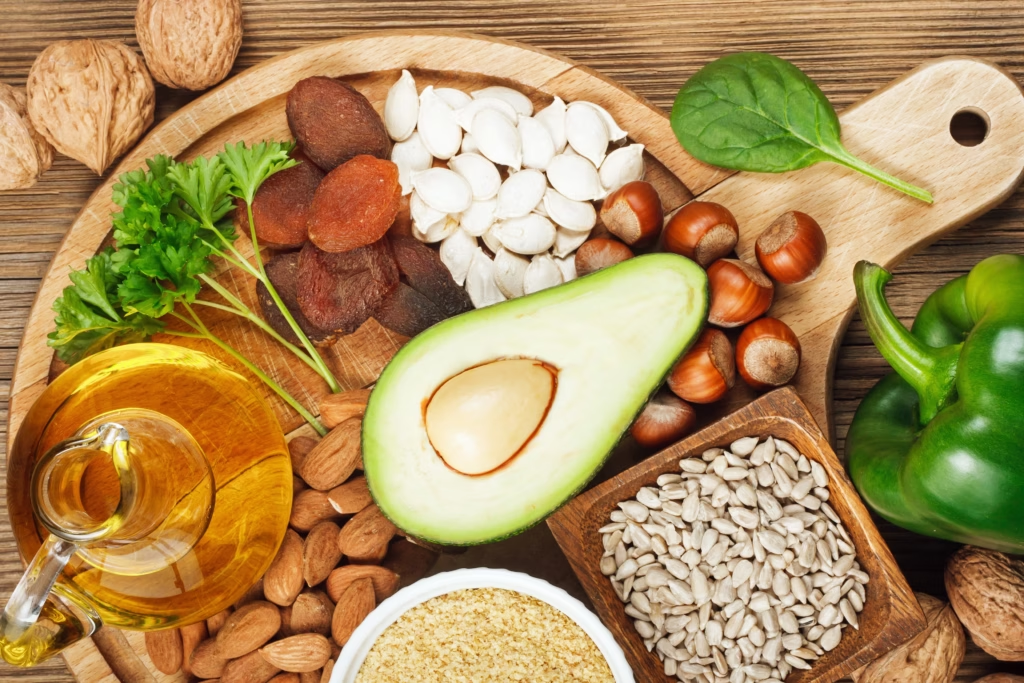
Vitamin E is a powerful antioxidant that plays a vital role in keeping your body healthy. While it often flies under the radar compared to vitamins like C or D, Vitamin E is essential for your skin, immune system, and cells.
Vitamin E?
Vitamin E is a fat-soluble vitamin that acts as a powerful antioxidant in the body. It helps protect your cells from damage caused by free radicals—unstable molecules that can harm cells and contribute to aging and diseases. Vitamin E also plays an important role in maintaining healthy skin, eyes, and a strong immune system. Since your body cannot produce it on its own, you need to get it from food sources like fruits, vegetables, nuts, and seeds.
Vitamin E: 6 Key Health Benefits
Vitamin E is an essential nutrient that plays a powerful role in keeping your body healthy. It supports your immune system, protects your cells from damage, and keeps your skin, eyes, and brain in good condition. In the next section, we’ll explore these key health benefits in more detail.
1. Protects Cells from Damage
Vitamin E works as an antioxidant, which helps neutralize harmful free radicals in the body. This protects your cells from damage and supports overall health.
2. Supports Immune System Function
It strengthens the immune system, helping your body fight off infections and stay healthy.
3. Promotes Healthy Skin
Vitamin E helps keep your skin moisturized and reduces signs of aging. It can also support healing from wounds or sun damage.
4. Maintains Good Eye Health
It plays a role in protecting your eyes from age-related damage, such as macular degeneration.
5. Helps with Heart Health
By reducing oxidative stress and inflammation, Vitamin E may support healthy blood vessels and lower the risk of heart disease.
6. Supports Brain Function
Some studies suggest that Vitamin E may help protect brain cells and slow cognitive decline as you age.
Vitamin E Deficiency: 6 Signs and Symptoms
Vitamin E deficiency is uncommon but can lead to serious health concerns, especially in people with digestive issues or problems absorbing fat. Since it’s a fat-soluble vitamin, poor absorption can reduce the body’s ability to use it properly. Here are some key signs and symptoms to be aware of.
1. Muscle Weakness
Low Vitamin E levels can affect the nerves and muscles, leading to muscle weakness or loss of strength.
2. Vision Problems
Deficiency may damage the retina and lead to vision issues, especially in severe or long-term cases.
3. Numbness and Tingling
Vitamin E helps maintain healthy nerve function. A lack of it can cause tingling, numbness, or a pins-and-needles feeling in your limbs.
4. Difficulty with Balance and Coordination
Since Vitamin E supports the nervous system, deficiency may lead to problems with movement and balance.
5. Weakened Immune System
A shortage of Vitamin E can lower the body’s ability to fight infections and slow healing.
6. Dry or Rough Skin
Low levels might contribute to dry, irritated skin or worsen existing skin conditions.
Vitamin E: 6 Best Sources
Getting enough Vitamin E is easier than you might think. In the following points, you’ll learn about common foods and simple habits that can help you increase your Vitamin E intake naturally, along with options for supplementation if needed.
1. Eat Vitamin E-Rich Fruits
Fruits like avocados, kiwis, mangoes, papayas, and blackberries contain natural Vitamin E. Including these in your daily diet is an easy and tasty way to boost your intake.
2. Include Nuts and Seeds
Almonds, sunflower seeds, and hazelnuts are some of the best sources of Vitamin E. A small handful as a snack or added to meals can make a big difference.
3. Use Healthy Oils
Plant-based oils such as sunflower oil, wheat germ oil, and olive oil are rich in Vitamin E. Use them in cooking or salad dressings for extra nutrition.
4. Add Leafy Green Vegetables
Spinach, kale, and Swiss chard not only offer Vitamin E but are also packed with other essential vitamins and minerals.
5. Choose Fortified Foods
Some breakfast cereals, spreads, and juices are fortified with Vitamin E. Check the labels to make sure you’re getting enough.
6. Consider Supplements (If Needed)
If your diet is lacking or you have a medical condition that affects absorption, supplements might help. Always consult a doctor before taking them.
Conclusion/Takeaway
Vitamin E is a vital nutrient that supports many important functions in your body, from protecting your cells to maintaining healthy skin, eyes, and immune system. By including Vitamin E-rich foods like fruits, nuts, oils, and leafy greens in your diet, you can easily meet your daily needs and enjoy these health benefits. Remember, if you suspect a deficiency or have special health conditions, consult a healthcare professional before considering supplements.
Start adding Vitamin E-rich foods to your meals today for better health and vitality! Don’t forget to share this blog with friends and family so they can benefit too. For more tips on taking care of your mind and body, check out our guide on Simple Self-Care Routines to Reduce Stress and Anxiety.
Share Your Thoughts!
Have you noticed any benefits from including more Vitamin E in your diet? Or do you have favorite Vitamin E-rich recipes to share? Leave your comments below—we’d love to hear from you!